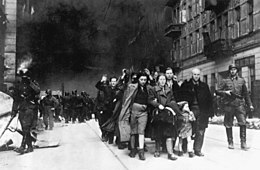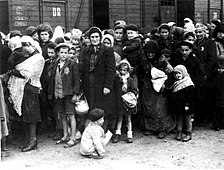| Revision as of 09:22, 10 May 2015 view sourceРаціональне анархіст (talk | contribs)2,829 edits →See also← Previous edit | Revision as of 03:57, 23 July 2015 view source Poeticbent (talk | contribs)Autopatrolled, Extended confirmed users, Pending changes reviewers29,717 edits added {{Infobox}} and missing internal linkNext edit → | ||
| Line 1: | Line 1: | ||
| {{Infobox holocaust event | |||
| ⚫ | |||
| | name = Ghetto uprisings | |||
| | image = Stroop Report - Warsaw Ghetto Uprising 09.jpg | |||
| | image_size = 260px | |||
| ⚫ | | caption = Captured Jews during ] led by the Germans for deportation to ]. Picture taken at Nowolipie street, near the intersection with Smocza | ||
| | AKA = | |||
| | location = ] | |||
| | date = ] | |||
| | incident_type = Armed revolt | |||
| }} | |||
| '''Ghetto uprisings''' during ] were the armed revolts by ]s and other prisoners incarcerated in the newly established ] after the German ] in 1939, as well as its own ally the Soviet Union in 1941. In most instances, the ghetto resistance fighters took up arms against the Nazi plans to deport all inhabitants to ] and ]s with the aim of their mass extermination.<ref name="ushmm4">{{cite web |url=http://www.ushmm.org/wlc/en/article.php?ModuleId=10005407 |title=Resistance in Ghettos |publisher=Holocaust Encyclopedia |work=Jewish Uprisings in Ghettos and Camps, 1941–1944 |date=June 10, 2013 |accessdate=9 January 2014}}</ref> | '''Ghetto uprisings''' during ] were the armed revolts by ]s and other prisoners incarcerated in the newly established ] after the German ] in 1939, as well as its own ally the Soviet Union in 1941. In most instances, the ghetto resistance fighters took up arms against the Nazi plans to deport all inhabitants to ] and ]s with the aim of their mass extermination.<ref name="ushmm4">{{cite web |url=http://www.ushmm.org/wlc/en/article.php?ModuleId=10005407 |title=Resistance in Ghettos |publisher=Holocaust Encyclopedia |work=Jewish Uprisings in Ghettos and Camps, 1941–1944 |date=June 10, 2013 |accessdate=9 January 2014}}</ref> | ||
| Armed resistance was offered in over 100 ghettos.<ref name="ushmm">{{cite web |url=https://web.archive.org/web/20120126200522/http://www.ushmm.org/wlc/en/article.php?ModuleId=10005213 |title=Jewish Resistance |publisher=United States Holocaust Memorial Museum |year=2011 |accessdate=9 January 2014}}</ref> Some of these uprisings were more massive and organized, while others were small and spontaneous. The best known and the biggest of such uprisings took place in ] in April–May 1943.<ref name="ushmm3">{{cite web |url=http://www.ushmm.org/learn/timeline-of-events/1942-1945/warsaw-ghetto-uprising |title=April–May 1943, Warsaw Ghetto Uprising |publisher=United States Holocaust Memorial Museum |work=Timeline of Events |year=2013 |accessdate=9 January 2014}}</ref> In the course of the ] 56,065 Jews were either killed on the spot or captured and transported aboard ] to ] before ] was razed to the ground, according ].<ref name="historynet">{{cite web |url=http://www.historynet.com/world-war-ii-warsaw-ghetto-uprising.htm |title=World War II: Warsaw Ghetto Uprising |publisher=Originally published by ''World War II'' magazine |date=12 June 2006 |accessdate=4 September 2014}}</ref><ref name="zssedu">{{cite web |url=http://zssedu.wordpress.com/2011/04/19/a-somber-anniversary/ |title=A Somber Anniversary |publisher=ZSSEDU |date=19 April 2011 |author=Marcin Wilczek |accessdate=4 September 2014}}</ref> There were also other such struggles leading to the wholesale burning of the ghettos.<ref name="ushmm2">{{cite web |url=https://web.archive.org/web/20121028122151/http://www.ushmm.org/wlc/en/article.php?ModuleId=10005188 |title=Warsaw Ghetto Uprising |publisher=Holocaust Memorial Museum, Washington DC |work=Holocaust Encyclopedia |year=2012 |accessdate=9 January 2014}}</ref> | Armed resistance was offered in over 100 ghettos.<ref name="ushmm">{{cite web |url=https://web.archive.org/web/20120126200522/http://www.ushmm.org/wlc/en/article.php?ModuleId=10005213 |title=Jewish Resistance |publisher=United States Holocaust Memorial Museum |year=2011 |accessdate=9 January 2014}}</ref> Some of these uprisings were more massive and organized, while others were small and spontaneous. The best known and the biggest of such uprisings took place in ] in April–May 1943.<ref name="ushmm3">{{cite web |url=http://www.ushmm.org/learn/timeline-of-events/1942-1945/warsaw-ghetto-uprising |title=April–May 1943, Warsaw Ghetto Uprising |publisher=United States Holocaust Memorial Museum |work=Timeline of Events |year=2013 |accessdate=9 January 2014}}</ref> In the course of the ] 56,065 Jews were either killed on the spot or captured and transported aboard ] to ] before ] was razed to the ground, according ].<ref name="historynet">{{cite web |url=http://www.historynet.com/world-war-ii-warsaw-ghetto-uprising.htm |title=World War II: Warsaw Ghetto Uprising |publisher=Originally published by ''World War II'' magazine |date=12 June 2006 |accessdate=4 September 2014}}</ref><ref name="zssedu">{{cite web |url=http://zssedu.wordpress.com/2011/04/19/a-somber-anniversary/ |title=A Somber Anniversary |publisher=ZSSEDU |date=19 April 2011 |author=Marcin Wilczek |accessdate=4 September 2014}}</ref> There were also other such struggles leading to the wholesale burning of the ghettos.<ref name="ushmm2">{{cite web |url=https://web.archive.org/web/20121028122151/http://www.ushmm.org/wlc/en/article.php?ModuleId=10005188 |title=Warsaw Ghetto Uprising |publisher=Holocaust Memorial Museum, Washington DC |work=Holocaust Encyclopedia |year=2012 |accessdate=9 January 2014}}</ref> | ||
| ⚫ | {{The Holocaust sidebar}} | ||
| ==Selected ghetto uprisings during the Holocaust== | ==Selected ghetto uprisings during the Holocaust== | ||
| Line 15: | Line 23: | ||
| * ] organised by the ] and ] | * ] organised by the ] and ] | ||
| * ] Resistance movement | * ] Resistance movement | ||
| ⚫ | {{The Holocaust sidebar}} | ||
| To some extent the armed struggle was also carried out during the final liquidation of the Ghettos |
To some extent the armed struggle was also carried out during the final liquidation of the Ghettos as a way of meeting death with courage rather than be taken away: | ||
| * ] | * ] | ||
| * ] | * ] | ||
| * ] | * ] | ||
| * ] | |||
| * ] | * ] | ||
| * ] | * ] | ||
Revision as of 03:57, 23 July 2015
| Ghetto uprisings | |
|---|---|
 Captured Jews during Warsaw Ghetto Uprising led by the Germans for deportation to death camps. Picture taken at Nowolipie street, near the intersection with Smocza Captured Jews during Warsaw Ghetto Uprising led by the Germans for deportation to death camps. Picture taken at Nowolipie street, near the intersection with Smocza | |
| Location | German-occupied Europe |
| Date | World War II |
| Incident type | Armed revolt |
Ghetto uprisings during World War II were the armed revolts by Jews and other prisoners incarcerated in the newly established ghettos in Nazi-occupied Europe after the German invasion of Poland in 1939, as well as its own ally the Soviet Union in 1941. In most instances, the ghetto resistance fighters took up arms against the Nazi plans to deport all inhabitants to concentration and extermination camps with the aim of their mass extermination.
Armed resistance was offered in over 100 ghettos. Some of these uprisings were more massive and organized, while others were small and spontaneous. The best known and the biggest of such uprisings took place in Warsaw in April–May 1943. In the course of the Warsaw Ghetto Uprising 56,065 Jews were either killed on the spot or captured and transported aboard Holocaust trains to extermination camps before the Ghetto was razed to the ground, according Stroop Report. There were also other such struggles leading to the wholesale burning of the ghettos.
Selected ghetto uprisings during the Holocaust
Notable instances included:
- Będzin Ghetto Uprising also known as the Będzin-Sosnowiec Ghetto Uprising
- Białystok Ghetto Uprising - organized by the Antyfaszystowska Organizacja Bojowa
- Częstochowa Ghetto Uprising
- Łachwa (Lakhva) Ghetto Uprising
- Mińsk Mazowiecki Ghetto Retaliation action
- Warsaw Ghetto Uprising organised by the ŻOB and ŻZW
- Riga Ghetto Resistance movement
| Part of a series on | ||||||||||
| The Holocaust | ||||||||||
|---|---|---|---|---|---|---|---|---|---|---|
 Jews on selection ramp at Auschwitz, May 1944 Jews on selection ramp at Auschwitz, May 1944 | ||||||||||
Responsibility
|
||||||||||
| Early policies | ||||||||||
| Victims | ||||||||||
|
Ghettos
Jewish ghettos in German-occupied Poland |
||||||||||
Camps
|
||||||||||
Atrocities
|
||||||||||
Resistance
|
||||||||||
|
International responseJoint Declaration by Members of the United Nations |
||||||||||
|
Aftermath
Reparations Agreement between Israel and the Federal Republic of Germany |
||||||||||
|
Lists
Deportations of French Jews to death camps |
||||||||||
|
Resources
The Destruction of the European Jews Functionalism versus intentionalism |
||||||||||
| Remembrance | ||||||||||
To some extent the armed struggle was also carried out during the final liquidation of the Ghettos as a way of meeting death with courage rather than be taken away:
- Kraków Ghetto
- Łódź Ghetto
- Lwów Ghetto
- Łuck Ghetto
- Marcinkonys Ghetto
- Minsk Ghetto
- Pińsk Ghetto
- Sosnowiec Ghetto
- Wilno (Vilna) Ghetto - resistance of the Fareinigte Partizaner Organizacje
See also
- Anti-fascism
- Ghettos in Nazi-occupied Europe
- Ghetto Fighters' House
- Jewish response to The Forty Days of Musa Dagh
- Nazi gun control theory
References
- "Resistance in Ghettos". Jewish Uprisings in Ghettos and Camps, 1941–1944. Holocaust Encyclopedia. June 10, 2013. Retrieved 9 January 2014.
- "Jewish Resistance". United States Holocaust Memorial Museum. 2011. Retrieved 9 January 2014.
- "April–May 1943, Warsaw Ghetto Uprising". Timeline of Events. United States Holocaust Memorial Museum. 2013. Retrieved 9 January 2014.
- "World War II: Warsaw Ghetto Uprising". Originally published by World War II magazine. 12 June 2006. Retrieved 4 September 2014.
{{cite web}}: Italic or bold markup not allowed in:|publisher=(help) - Marcin Wilczek (19 April 2011). "A Somber Anniversary". ZSSEDU. Retrieved 4 September 2014.
- "Warsaw Ghetto Uprising". Holocaust Encyclopedia. Holocaust Memorial Museum, Washington DC. 2012. Retrieved 9 January 2014.
- "Map of the Jewish uprisings in World War II" (PDF file, direct download 169 KB). Yad Vashem. 2013. Retrieved 9 January 2014.
- Jewish Armed Resistance and Rebellions on the Yad Vashem website. Retrieved 9 January 2014.
| Polish wars and conflicts | |||||||||
|---|---|---|---|---|---|---|---|---|---|
| General and related |
| ||||||||
| Piast Poland |
| ||||||||
| Jagiellon Poland |
| ||||||||
| Commonwealth |
| ||||||||
| Poland partitioned | |||||||||
| Second Republic | |||||||||
| World War II in Poland |
| ||||||||
| People's Republic | |||||||||
| Third Republic | |||||||||


